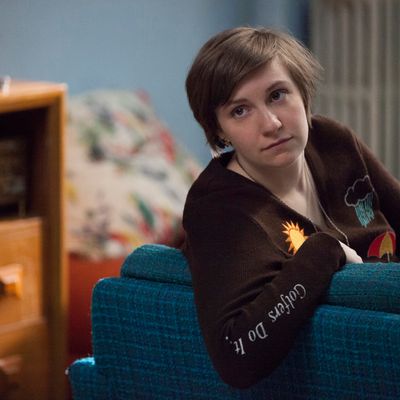
“I’m not gonna change into a different person just because you want me to,” Adam (Adam Driver) tells Girls heroine Hannah (Lena Dunham) in the sitcom’s third season. “You have to,” she says, exasperated. “It’s called being in a relationship.” Well, not exactly: You have to adjust when you’re in a relationship, but it’s unreasonable to expect a person to completely or even substantially change; and if that level of metamorphosis is required, the relationship’s probably not meant to be. (As my colleague Margaret Lyons wrote, “All the couples on Girls should break up.”) Girls is well aware of the conundrum Hannah and Adam and other characters are trapped in — we’re all trapped in it, to some degree — and it has sense enough to let us figure this, and a lot of other things, out for ourselves.
Season three seems to pick up fairly close to where two left off. Adam and Hannah have settled into their coupledom, though Adam calls b.s. on his girlfriend more often and more pointedly — or at least it feels that way — and Hannah is showing increased discomfort with knowledge of Adam’s pre- and post-Hannah sex life (often a stereotypically male source of anxiety in romantic comedies). The unnerving peak comes (badum- TSSSH) when Adam’s most recent ex (Shiri Appleby) runs into him at Grumpy’s and doesn’t heed the “Do Not Engage” sign buzzing in her forebrain. “You two should enjoy your urine-soaked life fucking like the two feral animals you both are,” she tells Adam and Hannah. “You’re going to end up with a baby that you don’t know how to care for. You’re going to kill your kid. You’re going to give it spoiled formula. You’re not gonna get any milk out of those tits.” That could be either a voodoo curse, or text on the meanest “Congratulations on your engagement” letter of all time.
Hannah seems to have her obsessive-compulsive disorder (which was detailed last season but intimated in season one) under control, and is laboring to finish her memoir; there are professional complications in her future that I won’t divulge here; suffice to say they’re out of left field yet dramatically perfect, illuminating some of Hannah’s character flaws (or personality traits, if you feel like being charitable) as well as some unpleasant but irrefutable larger truths about how we process bad things that don’t directly affect us.
The foremost exponent of this attitude is Jessa (Jemima Kirke), who seems to be turning into one of those supremely nihilistic Mike Leigh characters (like a younger, prettier, female Johnny from Naked, maybe); she’s the only character on Girls who gives Hannah a run for her money in the “dare you to like me” department. “I’m really on a mission to improve myself,” Jessa says. I’ve never heard that sentence sound so menacing. We don’t utterly despise her, though, because we’ve met her family (they’re quite a burden to carry around) and because she seems to be overcompensating. As another character tells her this season, she’s entirely too young to act so jaded. You can’t convincingly do a “seen it all” attitude if you’re too young to have seen much of anything.
Marnie (Allison Williams) is on her own following her breakup with Charlie (Christopher Abbott). This will come as a shock if you remember Marnie walking with Charlie through the meatpacking district at the end of last season and bizarrely declaring that she wanted to have his “brown babies,” but not if you heard that Abbott quit the show. It’s sad but comically pleasing to see Marnie marinating in despair after losing Charlie; her mother (Rita Wilson) advises her never to say his name, because “just saying his name gives him power,” but post-breakup funks are always a bit self-flagellating, so that’s just not possible. Shoshanna (Zosia Mamet) is in a new relationship and her ex-boyfriend Ray (Alex Karpovsky) seems on track to become a semi-respectable, fully employed, manager-type person at Grumpy’s. They’re both spending a lot of time thinking about each other and making choices partly based on the ache of absence.
Are we supposed to like any of these characters? I seriously doubt it. Like a lot of pay cable shows, and a lot of non-Hollywood movies, Girls would rather you find its people compelling (however grimly) than think of them as marvelous individuals whom you’d love to hang around with and confide in. The nails-on-a-chalkboard tone of some of the characters’ delusional pronouncements links Girls to a more confrontational (or at least knowingly unpleasant) strain in American comedy, represented by early Albert Brooks, post–Mia Farrow Woody Allen, and nearly every TV production associated with the Seinfeld posse, including Curb Your Enthusiasm and Veep.
A lot of Girls’ third season is about the empathy gap between major characters, particularly the difference between how we deal with our own misfortune versus how we deal with others’. The short version was summed up by Mel Brooks: “Tragedy is when I cut my finger. Comedy is when you fall into an open sewer and die.” It’s elaborated on in this season’s fourth episode, a nearly perfect half-hour co-written by Dunham and Judd Apatow that sums up Girls’ attitude toward its characters, its audience, and life in general. “She, like, choked on her own vomit or something,” Jessa says, relating the sad story of a person who died too young. It’s the “or something” that makes it art.


